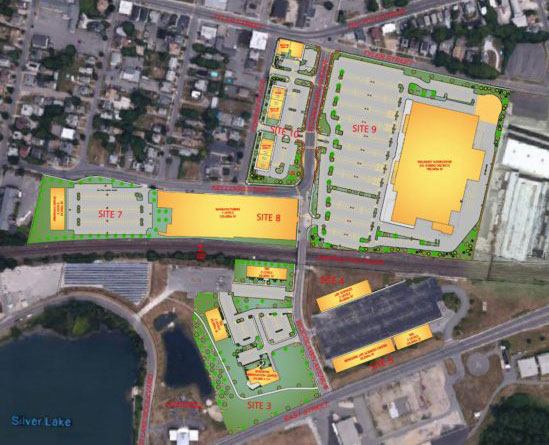By Andy McKeever
iBerkshires Staff
March 9, 2018
PITTSFIELD, Mass. — It was in March 2008 when former Sen. Benjamin Downing and former state Rep. Christopher Speranzo secured $6.5 million to build what was then conceived to be an incubator building at the William Stanley Business Park, spurring the life science economy.
“It is important that Western Massachusetts carve its own niche in the commonwealth’s emerging life science industry,” Downing said at the time.
But now, both Downing and Speranzo are out of office. That 2008 earmark has floated through three different mayoral administrations, two governors, two congressmen, and many city councilors.
But that desire to carve out a niche has not wavered.
On Friday, Gov. Charlie Baker and other state and local officials announced the final piece of funding to make the research and development center a reality and a groundbreaking for the $13.7 million project is expected this fall.
“We have accomplished an amazing collaborative effort with so many people who believe in our city, believe in our region. The William Stanley Business Park is going to change in not only what it looks like but in how it delivers for our advanced manufacturers here in Pittsfield and the Berkshires,” Mayor Linda Tyer said.
The center tackles some of the city’s biggest economic needs. It provides support for small and medium-sized businesses by giving them a facility to use high-tech equipment the company may never be able to purchase on its own. A number of businesses have signed on to become members of the non-profit Berkshire Innovation Center, Inc. and their annual memberships give them access to cutting-edge equipment to test and develop new products.
“The life sciences is a sector, is a culture, throughout the entire Commonwealth of Massachusetts. It is not just in Cambridge and Boston. But there are opportunities for economic development within this high tech cluster throughout the entire Commonwealth of Massachusetts,” said Massachusetts Life Sciences Center President and CEO Travis McCready.
“If you discover here, you ought to be able to make it here.”
The 20,000 square-foot facility is mostly supported by the Massachusetts Life Sciences Center. The city contributed $1 million from the General Electric Economic Development Fund and the Pittsfield Economic Development Authority added $300,000. MassDevelopment, another state partner in the project, contributed an additional $400,000. The $13.7 million will cover construction, equipment, and soft costs associated with the organization.
“It is definitely a milestone but it is not the finish line. It is not a victory lap. It is the start of the real work we need to do to build the center and continue with the mission of the Berkshire Innovation Center,” said BIC Chairman Stephen Boyd.
The second piece to the economic puzzle is workforce development. There has been a longstanding gap between the available jobs and the skills the workers in the county possess. The BIC includes a component in which education institutes, from the local high schools to state colleges to RPI, have all added to it. Those will use the center to develop programs that closely match what the employers in the region need.
“This is an incredibly exciting day for the entire Berkshires. This is what we’ve been looking for, to create this shared R+D facility and to provide opportunities for so many people at some many different levels of the workforce to up their game, up their skill level, and to provide those connections to allow our businesses to grow,” Berkshire Community College President Ellen Kennedy said.
“We’re really connected now with so many of the businesses and what their workforce skills needs are. We can develop short-term things, longer-term things, bringing different people to the table.”
Kennedy called Friday’s announcement a “gamechanger” in matching the skills an employer wants with the skills a college graduate has. That is expected to help create a pipeline from high school or college into high paying, skilled jobs.
“The opportunity to leap forward into the next generation of advanced manufacturing and life science, and to be able to build on a history and knowledge base and transform it into the next generation of jobs and products and companies, is a very real and significant one,” Baker said.
In advanced manufacturing, it has been estimated that 100,000 new jobs will be opening in the next decade. The sector has been cited as one of growth for the state of Massachusetts, but not all of the jobs are being filled right now.
“There are 6 million jobs in American every single day the Department of Labor says goes unfilled. In New England, the smallest geographic region in the country, right now 18,000 precision manufacturing jobs go unfilled. Stunning when you look at the reality of what that means,” U.S. Rep. Richard Neal said.
Neal said the BIC project hits a “structural” issue with the economy when it comes to worker participation rate. He said those numbers continue to be low nationwide.
“The best poverty program is still a good job. It is transformative,” Neal said.
Ever since General Electric left the city, many have said that manufacturing left with it. But in 2013, the UMass Donahue Institute published a study, funded by the Pittsfield Economic Revitalization Corp, which showed manufacturing remains a strong piece of the local economy.
“Manufacturing remains a critical part of the economy of Berkshire County. Key strengths reside primarily in paper manufacturing, plastics and rubber products, printing, chemicals, minerals, fabricated metal, and machinery,” the Berkshire Advanced Manufacturing Study reads.
“In terms of total wages, manufacturing is the second largest industrial sector in the county. Despite shrinking over time, manufacturing remains a crucial part of the Berkshire County economy and the economic base of the state.”
The study did also cite a struggle to fill those positions, reading “one firm estimated that 40 percent of its staff would need to be replaced due to retirements or age by the year 2020, while another assessed that young workers cannot immediately fill the jobs of the pending retirees because of their largely inadequate training in STEM discipline.”
That report had emphasized the potential impact such a project would have to Tyer and what led her to make closing the funding a gap a priority in her administration.
“What really convinced me was the Berkshire Advanced Manufacturing study, that showed there is a growing and thriving section of advanced manufacturing in the Berkshires. And it was the business leaders who said to me, we need a place where we can have access to cutting-edge equipment for research and development to design and engineer new products,” Tyer said.
“It is a powerful and growing sector of our economy.”
Tyer had taken on the project after being elected and was the third mayor to work on it. At the time she took office, there was an estimated $3 million funding gap. Tyer met with Secretary of Housing and Economic Development Jay Ash multiple times after taking office and her administration looked to heighten the workforce development piece.
“This is an investment in Pittsfield’s future. It is an investment for the next generations of your sons and daughters who will find more opportunity and a reason to stay here,” Lt. Gov. Karyn Polito said.
Mayor Linda Tyer picked up where two prior administrations left off on the project and now a groundbreaking is expected this year.
Prior to Tyer taking over the project was former Mayor Daniel Bianchi. Bianchi inherited it from former Mayor James Ruberto. One of the first tasks Bianchi did when getting the earmark of $6.5 million was to hire Rod Jané, of the firm New England Expansion Strategies, head the project. Jane reviewed all of the literature and studies and ultimately determined that an “incubator” wouldn’t necessarily the best for the Berkshires.
Jané then led the development of the Innovation Center concept, one that focused on the small and medium businesses and education. He saw helping the existing businesses as a better way to build that economic cluster.
“We are a long way from the finish line on this but this is going to access tremendous opportunities for the youngsters of Berkshire County, to really give them exposure to cutting edge technology and innovation. But it is also going to provide a lot of the businesses here in Berkshire County with access to technology that comes from places like RPI, the nanotechnology center, UMass Lowell, UMass Amherst and their expertise with polymer sciences. And it is going to be all under one roof,” Bianchi said on Friday.
The Massachusetts Life Science Center supported the new plan and upped its commitment to $9.7 million. The Berkshire Innovation Center was formed and a groundbreaking was set. The membership included the likes of Apex Resource Technologies, Synoco Plastics, Cavallero Plastics, Boyd Technologies, Intertech, Onyx Specialty Papers, and Berkshire Steel & Manufacturing, as well as many regional educational institutions such as State University of New York’s College of Nanoscience, Albany (N.Y.) Medical College, MassMEDIC, the University of Massachusetts at Amherst and Lowell, Berkshire Community College, McCann Technical School, Berkshire Community College, and Massachusetts College of Liberal Arts.
New equipment was ordered and stored at Taconic High School. The BIC started running training programs and workshops. And then in 2015, the bids for the project came in too high. The BIC cut the project down but still couldn’t make the numbers work.
“Every one of the members signed up with the project that would have already been up and running at this point. We originally thought about a 2017 ribbon cutting,” Boyd said.
Bianchi said, “it was very concerning that the funding wasn’t what it should have been. So it is great to get that funding together now so this project can actually happen. It appears to be adequate amounts of capital support to make it a reality and to bring the technology that is required.”
But most of the members stuck with the project. Boyd and BIC staff repeatedly made trips to Boston, asking Ash and others to invest more into the project. He recalled meeting with Baker and Polito two years ago to talk about the project. Tyer repeatedly pitched they project to state officials. State Rep. Tricia Farley-Bouvier and state Sen. Adam Hinds made phones and met with officials.
And that continual push worked. More than a year after the gap was identified, the state is now again upping its commitment to make the center a reality.
“I think it speaks to the commitment of the region, to collaboration, to innovation, and the value of the equipment it has – the economy of scale it provides to the local manufacturers,” Boyd said.
With Friday’s announcement, Boyd said the project is expected to break ground this fall and open a year later. He hopes that now the funding is all in place, even more, companies and educational institutions will be joining.
“The Berkshire Innovation Center is real. It is here to stay and we want to bring more members into the fold,” Boyd said.
City Councilor Melissa Mazzeo has been a long time supporter of the project. She has stood firm on the position that the new comprehensive high school in Taconic and the Berkshire Innovation Center will be key turning points for the city of Pittsfield.
“I’m absolutely thrilled. I’m thrilled for Berkshire County in general. I’ve been telling people when things don’t look like they are going well for Pittsfield to hang tight, that Taconic and the Berkshire Innovation Center is going to be our turnaround,” Mazzeo said. “We might have to wait a few years to get this up and running but we are going to see this come back for our future generations. Pittsfield is going to be on the map.”
Mazzeo credited the Tyer administration for seeing the value in the project and pushing for it.
The 20,000 square-foot building will be at the William Stanley Business Park, near East Street.
Farley-Bouvier said few of the officials at the Fridays announcement were there when the entire project started. But, that is what she means when she says “team Pittsfield.” It isn’t just who is there now working on the project, but who is going to continue to push for the city in the future, she said.
“Team Pittsfield doesn’t end today. This isn’t the end of this story and certainly not at the end of this project. Team Pittsfield is the people who come afterward,” Farley-Bouvier said.
That’s the kind of long-term vision she sees with the BIC. She said in all of the discussions about it, there was always an eye to make sure the project was done right for years to come.
“What we really care about is our grandchildren. And that is what this project is. It is going to be good for them,” Farley-Bouvier said. “We want to be able to have a strong economy for our grandchildren.”
That strong economy is also what officials hope for the future of the William Stanley Business Park. The BIC is eyed to help attract new companies to develop the industrial land formerly owned by General Electric.
“The succession of that property has a rich history. And Pittsfield has a rich history of not only innovation, and our future is certainly bright there, but also in our workforce,” PEDA Chairman Mick Callahan said.
The business park has been overseen by PEDA and efforts have been ongoing for years to redevelop it. Only a few parcels have been developed so far and there is plenty of acreage left.
“It will be stunning both outside and inside and will certainly be a catalyst for change for the park and attract more employers to be there,” Polito said.
The park is what is left of a massive piece of the city’s history, from the day William Stanley moved here to start Stanley Electric, which later became GE and employed thousands. But the company left and left a void in the center of the city.
“I love the fact that it is blossoming on the soil of the GE site because absent that next GE we know, the studies show, that it is the investments in those small and middle-sized companies, making sure they have everything they need in technology and training, it is the right strategy. It is the right industry and it is the right location,” Hinds said.
Baker said, “the part I find particularly poignant about this is that Berkshire County has a long and cherished and significant history in manufacturing.”
All involved know the work is far from over. But, Friday’s announcement caused quite a lot of excitement among city, county, state, education, and federal officials who have eyed this coming to fruition for years.
“We are extremely excited about the possibilities with this,” Baker said, but, “for me, the real exciting day is going to be the day when this starts translating to real jobs, real opportunities, real new businesses.”
Among the numerous elected officials, school personnel, and business leaders present were North Adams Mayor Thomas Bernard, former North Adams Mayor Richard Alcombright, McCann Tech Superintendent James Brosnan, MCLA President James Birge, Pittsfield Schools Superintendent Jason McCandless, Sheriff Thomas Bowler, and City Councilors Peter White, Christopher Connell, Anthony Simonelli, Melissa Mazzeo, Kevin Morandi, Earl Persip, Donna Todd Rivers, Helen Moon, and John Krol.

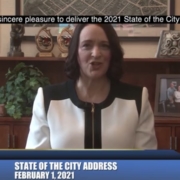
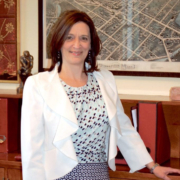
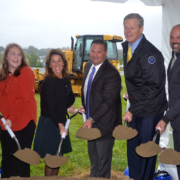
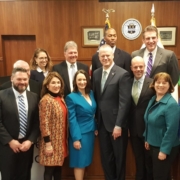
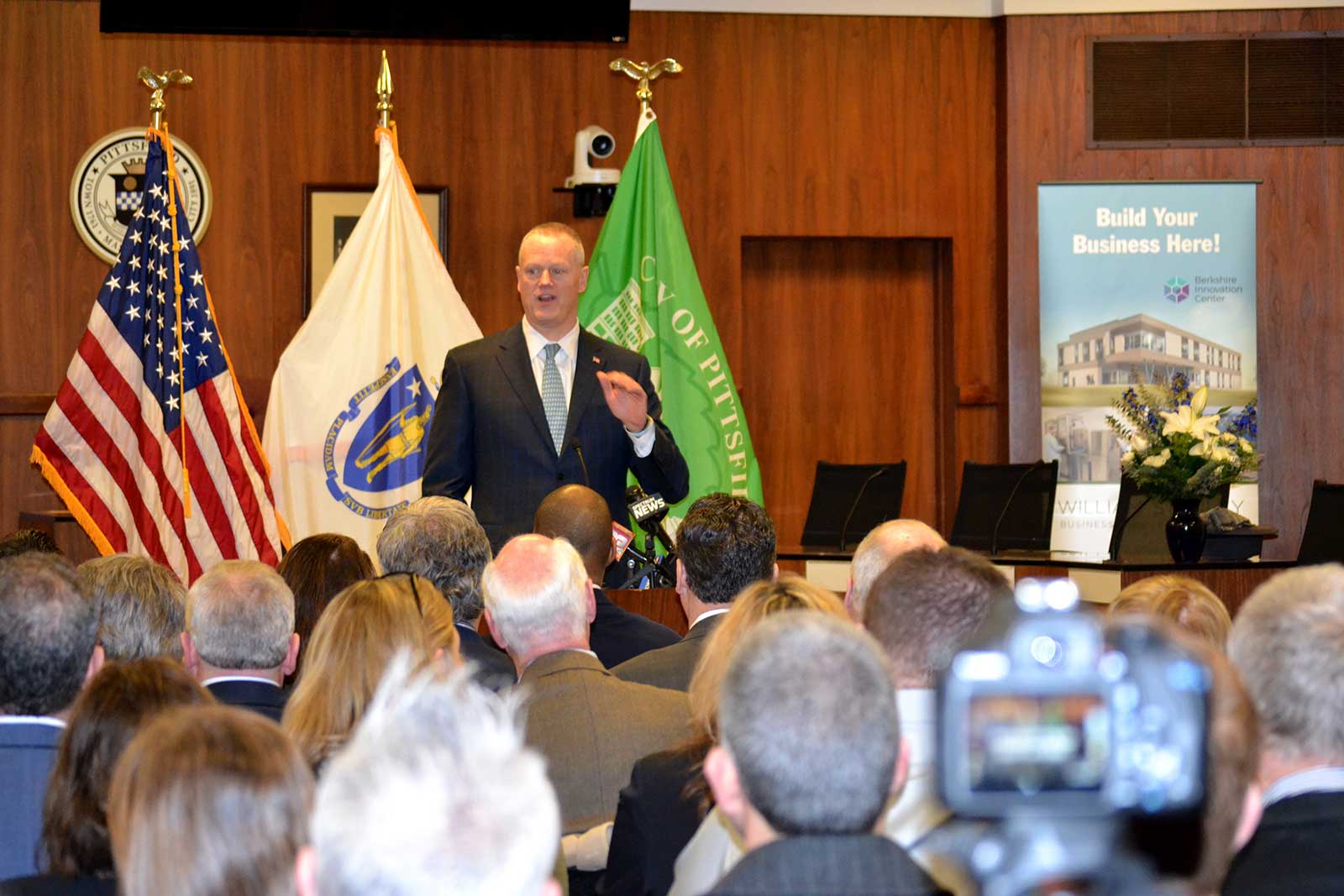
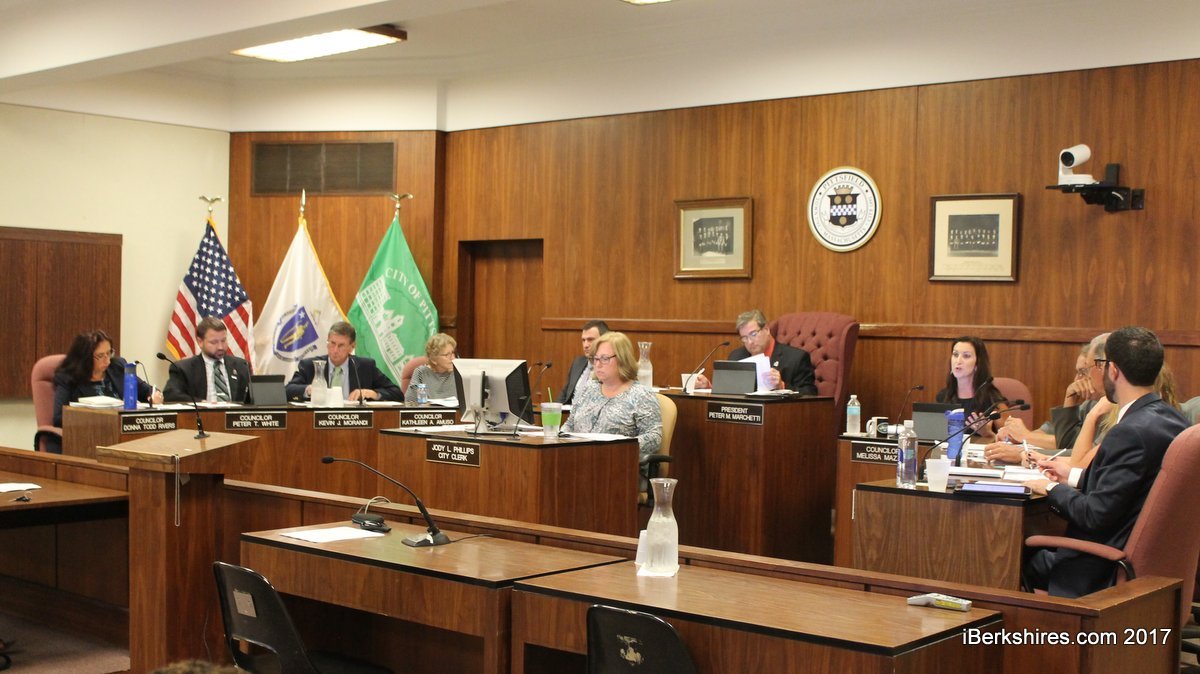
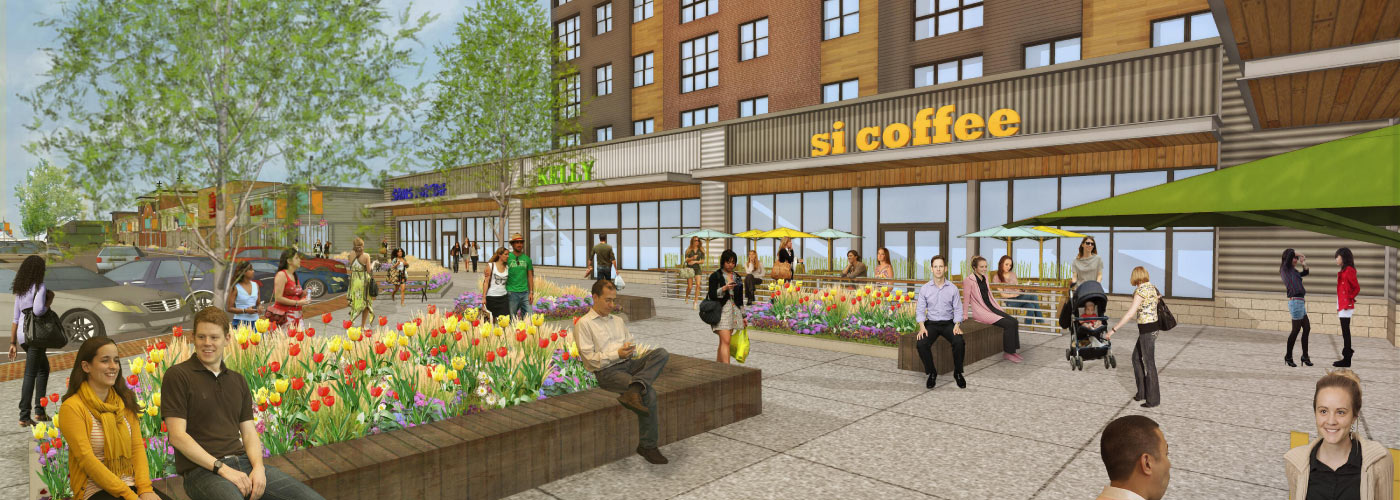
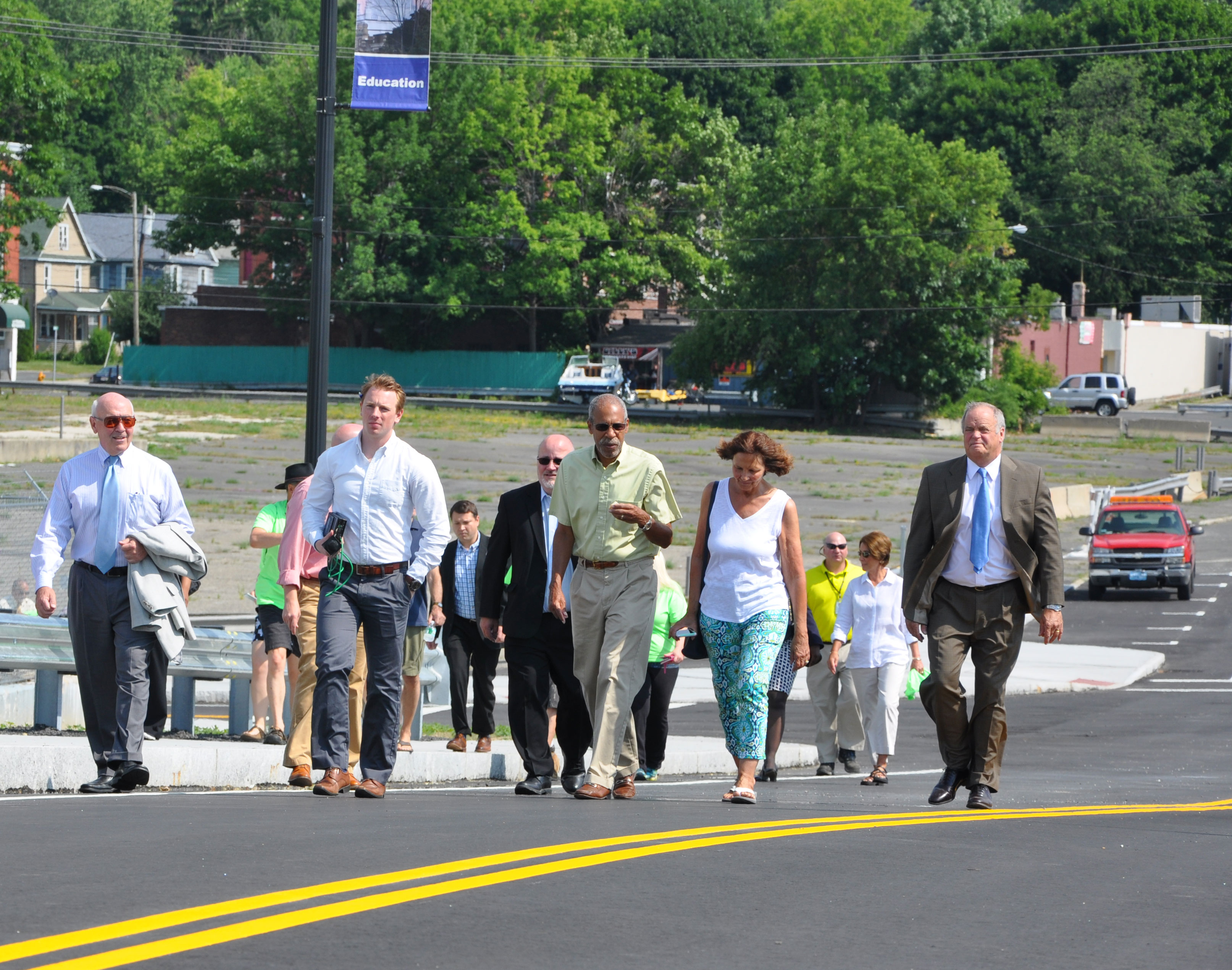
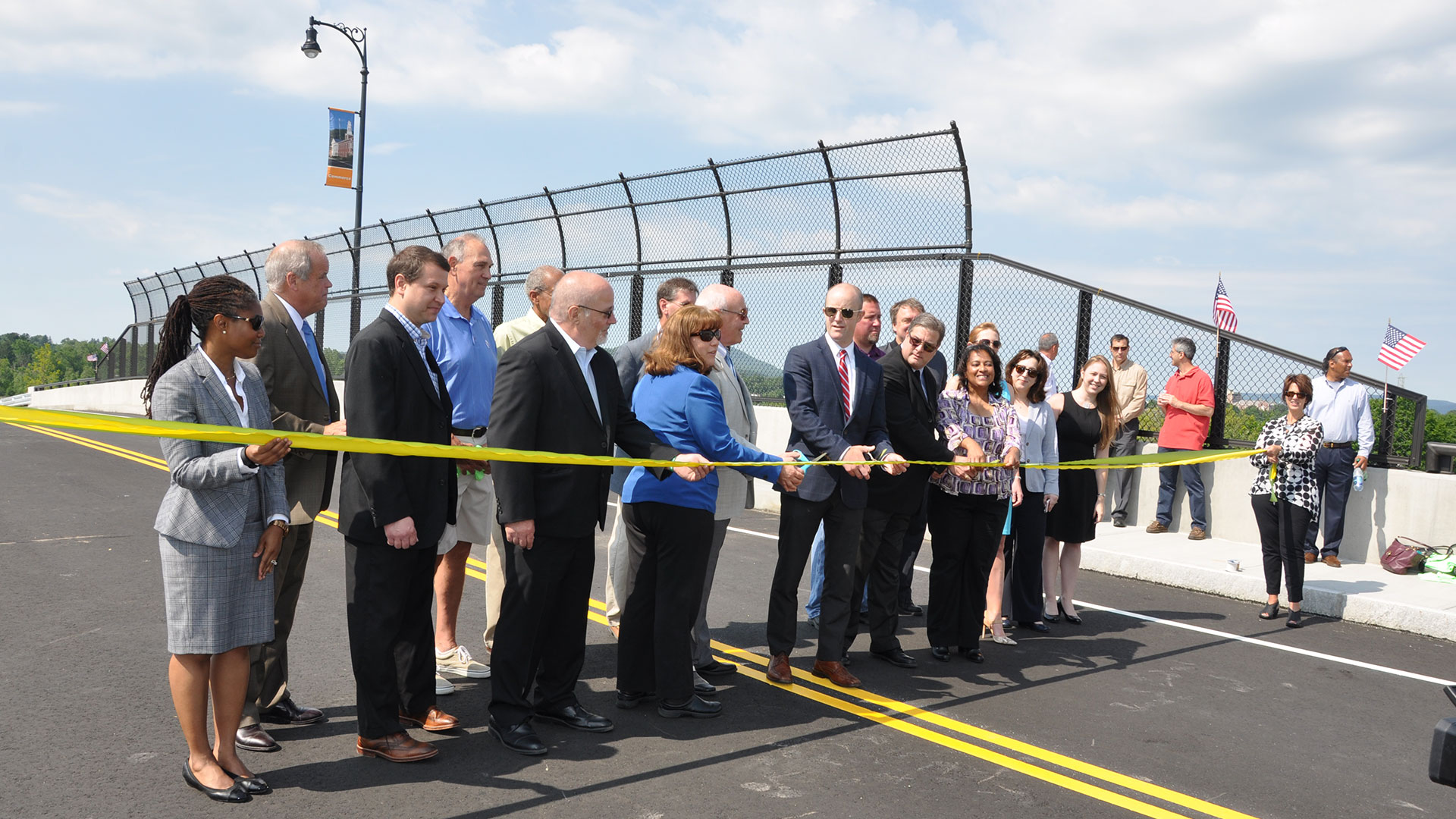
 Closed to traffic since 2006, the reconstructed bridge bisects the William Stanley Business Park and reconnects the Morningside neighborhood with East Street. General Electric transferred the privately owned road and bridge to PEDA in December of 2011 and an agreement was reached with the state and
Closed to traffic since 2006, the reconstructed bridge bisects the William Stanley Business Park and reconnects the Morningside neighborhood with East Street. General Electric transferred the privately owned road and bridge to PEDA in December of 2011 and an agreement was reached with the state and 